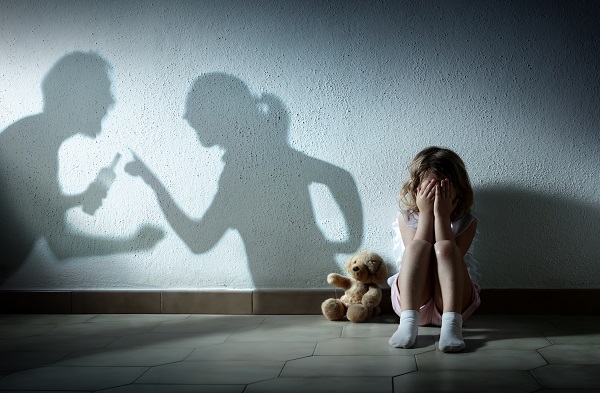Domestic violence is often viewed through the lens of its impact on the immediate victims typically women and men who suffer physical and emotional abuse. However, the profound effect of domestic violence on children living in abusive homes is frequently overlooked.
These children not only witness trauma, but they also experience deep psychological, emotional, and social consequences that can haunt them well into adulthood.
The hidden victims: Children of abusers
Domestic violence doesn’t only harm the person being physically attacked; it wreaks havoc on the entire family dynamic, with children frequently absorbing the brunt of the emotional turmoil. Children who live in homes where domestic violence occurs may not always be physically harmed, but the mental health implications are devastating and long-lasting.
Psychologists and social workers have long pointed to a range of emotional disorders that arise in children subjected to domestic violence, including anxiety, depression, post-traumatic stress disorder (PTSD), and behavioral problems. These children often experience a pervasive sense of fear and helplessness that deeply affects their emotional development.
Emotional and psychological consequences
- Anxiety and Fear: Children who live in violent homes often experience chronic anxiety. They may constantly feel on edge, anticipating the next outburst or physical confrontation. This constant state of heightened alertness can severely affect their emotional and cognitive development.
- Depression and Low Self-Worth: Children witnessing domestic violence are more likely to suffer from depression. They may feel isolated, rejected, and helpless, leading them to believe they are powerless to change their circumstances. This can also affect their self-esteem, leading them to internalize the violence as something they caused or deserved.
- Post-Traumatic Stress Disorder (PTSD): For many children, witnessing or being exposed to violent events can trigger PTSD. Symptoms may include nightmares, flashbacks, emotional numbness, and intense emotional reactions to reminders of the trauma.
- Behavioral Issues: Children exposed to domestic violence may develop behavioral problems. These can range from aggression toward others to withdrawal and a refusal to engage socially. In some cases, they may imitate the abusive behaviors they’ve witnessed, either as a form of coping or as learned behavior.
- Cognitive and Academic Difficulties: The mental strain of living in a violent environment often hinders a child’s ability to concentrate, leading to problems with schoolwork and social relationships. Many children from abusive households struggle academically and may eventually develop long-term learning difficulties.
Testimonies: Voices of children impacted by domestic violence
To further understand the devastating consequences of domestic violence on children, here are a few powerful testimonies from individuals who have lived through these experiences.
Testimony 1: Sarah, 14 Years Old
“I remember hiding under the bed, trying to cover my ears so I wouldn’t hear the yelling. I’d cry because I didn’t know what to do. My mom would tell me everything was fine, but it never felt fine. I always felt scared that one day, things would get worse and I wouldn’t be able to protect her. Now, I can’t stop feeling anxious. I can’t even talk to my friends without getting scared that they’ll get mad at me.”
Testimony 2: Jake, 17 Years Old
“I don’t even know what a normal house is supposed to feel like. When I was younger, I thought everyone’s parents fought like mine. The yelling, the breaking things, the police showing up… I used to wonder if we were just unlucky. Now, I feel like I’m always on guard. I can’t trust people. I feel like I’m the problem, like I should’ve done more to help my mom. I don’t know how to let anyone in.”
Testimony 3: Olivia, 12 Years Old
“I saw my dad hit my mom so many times. Every time I’d beg him to stop, he’d just yell at me, telling me to stay out of it. I tried to act like it didn’t bother me, but it did. I started feeling really sad all the time and couldn’t focus on school. Sometimes I think I might turn out like him, because that’s all I’ve ever seen. I’m scared of being angry like that, but I don’t know how to control it.”
Long term impact on adult life
The effects of domestic violence during childhood can persist throughout adulthood. Research has shown that children exposed to domestic violence are more likely to develop long-term mental health conditions such as chronic anxiety, depression, and difficulties with forming healthy relationships. Many go on to experience challenges in their own adult relationships, perpetuating a cycle of violence and emotional trauma.
In addition, these individuals may struggle with managing emotions, leading to problems with work, socialization, and overall life satisfaction. For some, these long-term consequences can lead to self-destructive behaviors such as substance abuse or even criminal activity.
Breaking the cycle: Support and intervention
While the effects of domestic violence on children are serious, there is hope for recovery and healing. Early intervention is key to helping children break the cycle of abuse and trauma. Mental health counseling, support groups, and therapy can all play a vital role in helping children process their trauma and develop healthy coping mechanisms.
Supportive environments, including stable living conditions and relationships with trusted adults, are crucial for children’s emotional recovery. In addition, educational programs that address emotional regulation, coping strategies, and resilience can help children overcome the impact of domestic violence and lead to healthier, more fulfilling lives.
Domestic violence casts a long shadow over the lives of children who witness or experience it. The mental health effects ranging from anxiety and depression to PTSD and behavioral difficulties re profound and often long lasting. However, through early intervention, emotional support, and access to mental health care, these children can begin to heal and break free from the cycle of violence.
Addressing the mental health needs of children affected by domestic violence should be a priority for communities, policymakers, and health professionals, as this can help prevent the intergenerational transmission of trauma and provide a pathway to recovery and resilience.
BY MUREKATETE Olive





